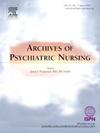Impact of sociodemographic factors and depression on medication adherence in schizophrenia: Cross sectional study in Morocco
IF 2.2
4区 医学
Q1 NURSING
引用次数: 0
Abstract
Background
Medication non-adherence in schizophrenia is a major cause of relapse and hospitalization, presenting a significant challenge for clinicians. This study was conducted to estimate the prevalence of medication non-adherence and identify the impact of depression, as well as other factors, on medication adherence in individuals with schizophrenia.
Methods
This was a cross-sectional study conducted among individuals with schizophrenia, both outpatients and inpatients. Data on sociodemographic, clinical, and therapeutic factors were collected using a dedicated questionnaire. Medication adherence and depression were assessed using two validated scales, the Medication Adherence Rating Scale (MARS) and the Calgary Depression Scale for Schizophrenia (CDSS), respectively.
Results
Among the 305 participants included in this study, 21.3 % had poor medication adherence according to the MARS scores. The logistic regression model showed that only work and depression were significant predictors of poor medication adherence in individuals with schizophrenia.
Conclusion
The results of this study highlight a less explored factor that can influence medication adherence in individuals with schizophrenia, namely, depression. This underpins the importance of treating the non-psychotic dimensions of schizophrenia in the recovery process. However, further studies are needed to better characterize the pathways of medication adherence in schizophrenia.
社会人口因素和抑郁症对精神分裂症患者坚持服药的影响:摩洛哥横断面研究
背景精神分裂症患者不遵医嘱用药是导致复发和住院治疗的主要原因,给临床医生带来了巨大挑战。本研究旨在估算精神分裂症患者不遵医嘱用药的发生率,并确定抑郁和其他因素对患者遵医嘱用药的影响。使用专门的调查问卷收集了有关社会人口学、临床和治疗因素的数据。研究使用两个经过验证的量表,即用药依从性评定量表(MARS)和卡尔加里精神分裂症抑郁量表(CDSS),对用药依从性和抑郁情况进行了评估。Logistic回归模型显示,只有工作和抑郁是精神分裂症患者服药依从性差的重要预测因素。这证明了在康复过程中治疗精神分裂症的非精神病因素的重要性。然而,要更好地确定精神分裂症患者坚持服药的途径,还需要进一步的研究。
本文章由计算机程序翻译,如有差异,请以英文原文为准。
求助全文
约1分钟内获得全文
求助全文
来源期刊
CiteScore
3.70
自引率
0.00%
发文量
131
审稿时长
160 days
期刊介绍:
Archives of Psychiatric Nursing disseminates original, peer-reviewed research that is of interest to psychiatric and mental health care nurses. The field is considered in its broadest perspective, including theory, practice and research applications related to all ages, special populations, settings, and interdisciplinary collaborations in both the public and private sectors. Through critical study, expositions, and review of practice, Archives of Psychiatric Nursing is a medium for clinical scholarship to provide theoretical linkages among diverse areas of practice.

 求助内容:
求助内容: 应助结果提醒方式:
应助结果提醒方式:


